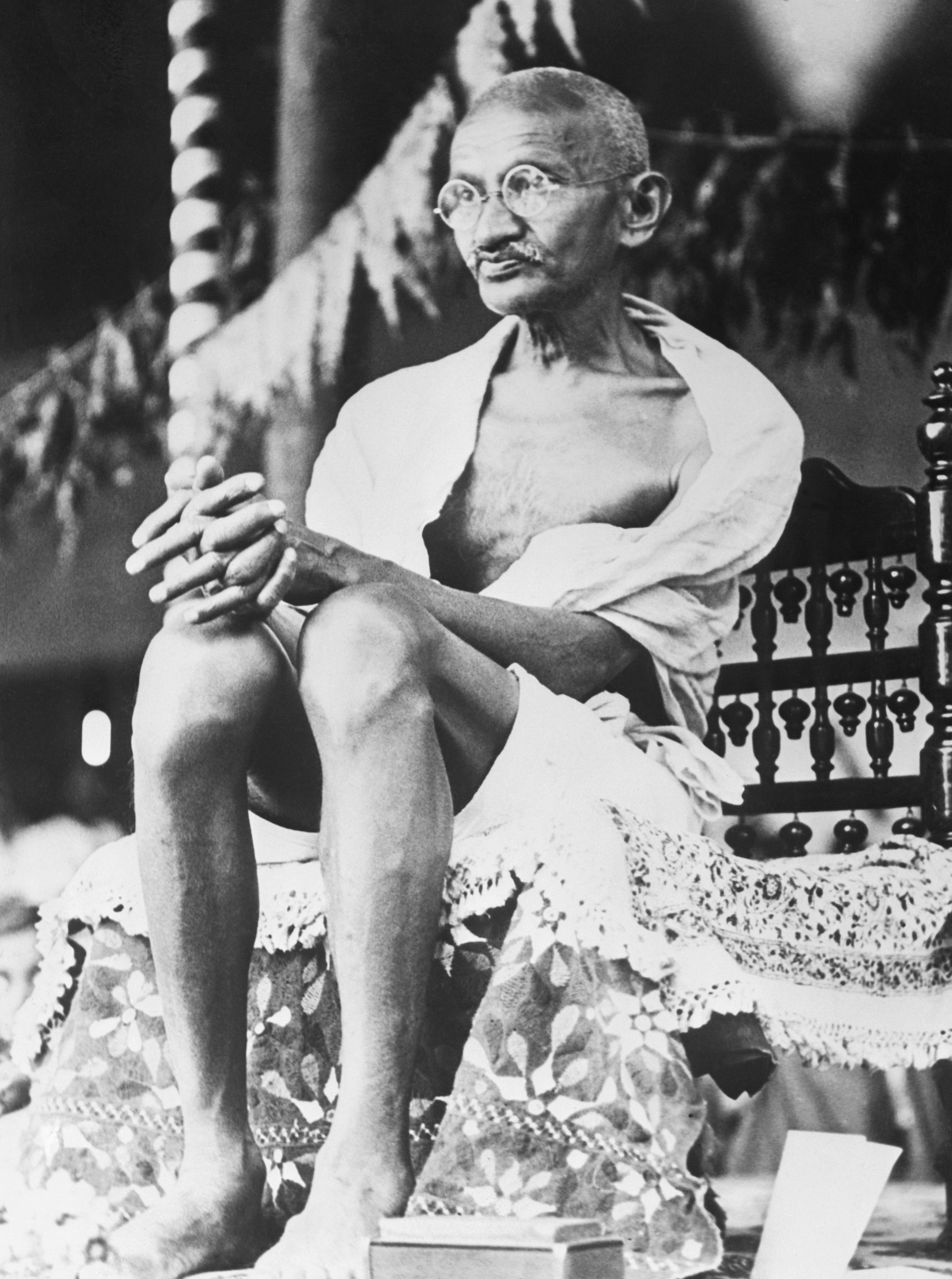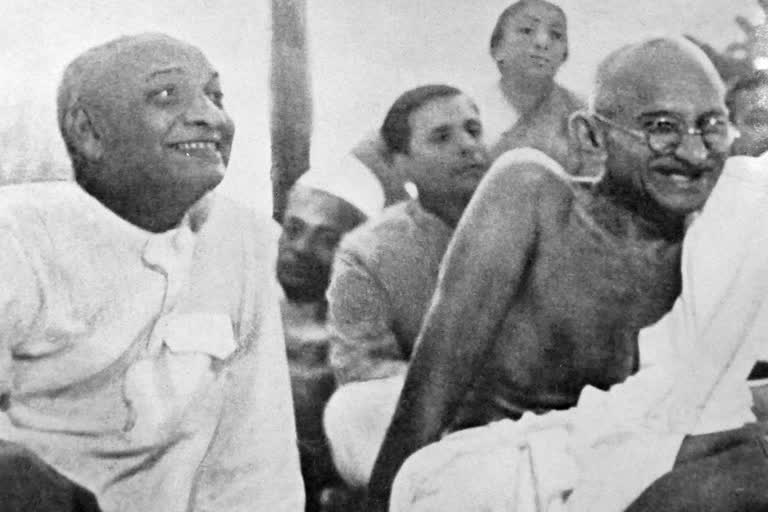Hyderabad: Mahatma Gandhi was an exceptional figure of the twentieth century. He drew immense power by unifying thought, word and deed. It is this uncompromising integrity of purpose and action that made Gandhiji irresistible to the world. For oppressed people everywhere, Gandhiji’s ability to fashion the tools of truth, Satyagraha and non-violence as powerful weapons against the might of the oppressor became a refreshing and powerful example.
It is true that Gandhiji’s extreme pacifism and non-violence would fail in situations where oppressor is pure evil and has no moral core. The Holocaust, mass genocide and ethnic cleansing, state-aggression unleashing war, terrorism – all these demand active resistance and use of force through all available means in order to prevent greater harm and suffering of the innocent. However, in most other situations the oppressor has a moral core and a sense of humanity, and Gandhiji’s methods worked admirably in such cases.
Gandhiji always rejected the oppressive status quo, as well as overt conflict and violence. Gandhiji’s genius lay in elevating issues to a plane of creative tension – neither meek submission to injustice nor bloody conflict. It is the efficacy of this method in most situations of asymmetry of power and injustice that made Gandhiji relevant to most oppressed people and mass movements.

Gandhiji created a galaxy of leaders in the Indian subcontinent during the national movement. Naturally, his message had a lasting impact in all nations of South Asia.
In the rest of Asia too his influence was profound. The struggle for democracy in the Philippines by Benigno Aquino Jr and after his assassination, by Corazon Aquino was deeply influenced by Mahatma Gandhi’s example. As a result, the Philippines saw the emergence of true democracy through peaceful protest after decades of tyranny under Marcos.
In South Korea, the rise of the Sixth Republic after decades of autocratic, military rule was largely a result of the peaceful, popular resistance to dictatorship. The popular pressure forced the revision of the constitution in 1987. Between 1987 and 2003 strong foundations were laid for democracy in South Korea.
Popular pressure and the leadership of Kim Young-Sam and Kim Dae-Jung both influenced by Gandhiji example saw the emergence of the economic giant as a stable and peaceful democracy with respect for human rights.
Aung San Suu Kyi, the Burmese leader, has been profoundly influenced by Gandhiji’s work and example.
She remained under house arrest for 15 of the 21 years between 1989 and 2010 and preferred incarceration to exile. She refused to leave the country to receive the Nobel Prize, or to meet her family and dying husband in Britain, for fear that she would not be allowed to return.
She acknowledged repeatedly that Gandhiji was the major influence in her life and work. She said, “You must remember that change through non-violent means was not even thought of before Gandhi. He was the one who started it, he was the one who decided that it is possible to bring about revolutionary change without violence.
Nelson Mandela who became a global symbol of resistance to injustice in the Post-War World was deeply influenced by Gandhiji’s life, teachings and methods. He acknowledged that it was Gandhian Philosophy “that achieved the mobilization of millions of South African during the 1952 defiance campaign, which established the African National Congress as a mass-based organization”.
Mandela referred to Gandhiji is “the sacred warrior,” who combined ethics and morality with a steely resolve that refused to compromise with the oppressor, the British Empire.
Mandela always regarded the Mahatma as an inspiration. “In a world driven by violence and strife, Gandhi’s message of peace and non-violence holds the key to human survival in the 21st century,” said Mandela. Mandela described Gandhiji’s essence thus, “He rightly believed in the efficacy of pitting the soul force of satyagraha against the brute force of the oppressor and in effect converting the oppressor to the right moral point”.
Martin Luther King Jr liked Gandhiji’s idea that oppressed people could use truth and love as weapons in their struggle for justice; and found practical application of that idea in the Montgomery bus boycott in 1955-56, and in all his later struggles for the rights of the Black people. King said, “Christ showed us the way, and Gandhi in India showed it could work”. He echoed Gandhiji’s views and repeatedly said it is possible to resist evil without resorting to violence and to oppose evil itself without opposing the people committing evil. He wrote, “The nonviolent resister not only refuses to shoot his opponent but he also refuses to hate him.”
King referred to Gandhi as “one of the individuals who greatly reveal the working of the spirit of God”. He visited India in 1959 and wrote, “I left India more convinced than ever that nonviolent resistance is the most potent weapon available to oppressed people in their struggle for freedom.” King even during his Noble Prize acceptance speech in 1964, acknowledged the inspiration he drew from Gandhiji.
Dalai Lama, one of the most revered spiritual teachers over the past 60 years, has been profoundly influenced by Gandhi. Dalai Lama always held that the only way of bringing about constructive political change through nonviolent means. He said, “Some people might say Gandhiji’s Ahimsa is powerless or pessimistic, but now the whole world is looking up to Mahatma Gandhi’s nonviolence.”
Al Gore was influenced by Gandhiji’s “truth force”, as well as his deep concern for the environment. Al Gore said, “Gandhi’s view was that truth has force in human affairs and when it is passionately expressed, it can be the most powerful force for changing things for the good”.
Barack Obama noted, “Throughout my life, I have always looked to Mahatma Gandhi as an inspiration because he embodies the kind of transformational change that can be made when ordinary people come together to do extraordinary things”. When asked who was the one person, dead or alive, that he would choose to dine with?, Obama replied “Gandhi” and he continued, “He is somebody I find a lot of inspiration in.
He inspired Dr King with his message of nonviolence. He ended up doing so much and changed the world just by the power of his ethics”.
Mexican-American civil rights and labour leader Cesar Chavez was deeply influenced by Gandhiji and modelled many of his tactics on Gandhiji’s methods. Chavez said of the Mahatma, “Not only did he talk about non-violence, but he also showed how non-violence works for justice and liberation”. Chavez maintained his commitment to non-violence even in the face of violent attacks.
Gandhiji’s ideas, his steadfast adherence to those beliefs in practice, his compassion and humanity, and his unflinching courage in the struggle against injustice and oppression influenced the world for more than a century. His message and life continue to shape our attitudes and mass movements world over in the 21st century.
The women’s liberation and environment movement among others have been deeply impacted by the work and teachings of Gandhiji. Modern World owes a debt of gratitude to this simple, half-naked man who taught us that we as a species should learn to coexist in harmony and resolve our differences peacefully, and we should learn to protect our flora and fauna for our collective survival and sanity. The humble, ordinary men and women everywhere intuitively recognize the truth of Gandhi’s life and teachings and their eternal relevance in shaping our lives and future.
Read:| J&K: Dry season for farmers after modification of Article 370



